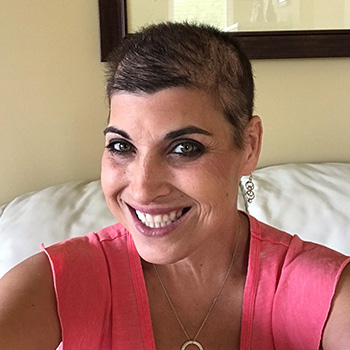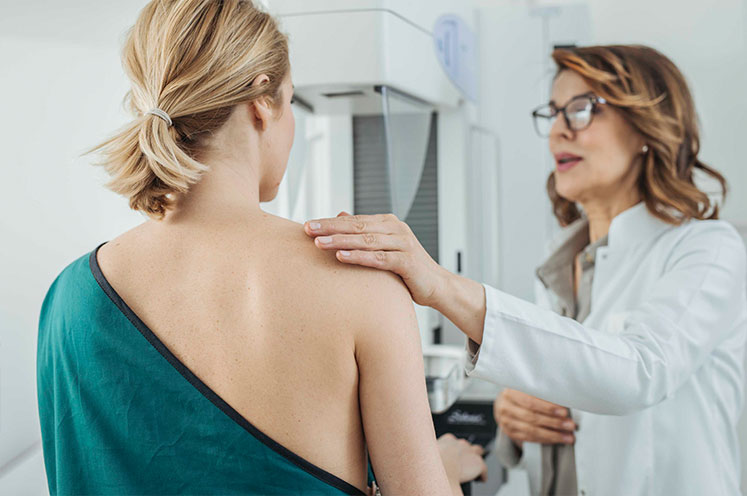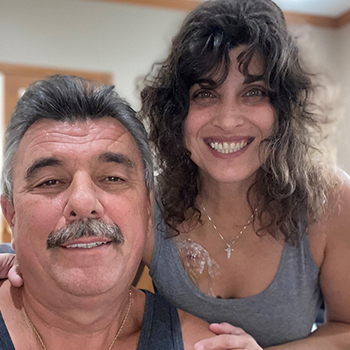Make Time for a Mammogram
Regular breast cancer screening is vital for early detection and successful treatment. A yearly mammogram is your first line of defense.
 “If I can run a trucking company, I can deal with breast cancer,” says Michelle Milenkovic, the work-loving owner of MGM Transportation in Washington Township. Her life would change quickly, but the empathy and skills of Henry Ford surgeons specializing in oncology and breast reconstruction would provide future options for enjoyment.
“If I can run a trucking company, I can deal with breast cancer,” says Michelle Milenkovic, the work-loving owner of MGM Transportation in Washington Township. Her life would change quickly, but the empathy and skills of Henry Ford surgeons specializing in oncology and breast reconstruction would provide future options for enjoyment.
Michelle’s idea of fun? “Work, work, and more work,” laughs Michelle, 52. Her favorite pastime? Weed whacking for seven hours on her family’s 10-acre property. Raised with five siblings, chores were a must and enjoying them was sensible.
“I’ve always been healthy,” says Michelle. But after Covid lingered, a shingles outbreak sent her to a doctor – the first one she had seen in ten years.
She had complete check-up, changed her diet, exercised more and lost 20 pounds. But her prescription for a mammogram wasn’t used – until one morning at 4:30 a.m.
“I rolled over in bed and felt a stabbing pain in my left breast. There was a mass,” says Michelle who quickly made an online appointment for a mammogram. After a required biopsy, her life would change.
Regular breast cancer screening is vital for early detection and successful treatment. A yearly mammogram is your first line of defense.


If you are diagnosed with breast cancer, our team of experts work together to provide you with the best and most individualized care.
At Henry Ford, Michelle and her husband met with a medical team that included physicians and a breast reconstruction specialist. Surgeon Lindsey Petersen, M.D. held Michelle’s hands and talked about the diagnosis: Triple negative breast cancer, stage 3, grade 3.
“Dr. Petersen told me, ‘This is aggressive, but we’re going to take care of you,’” says Michelle.
Work decisions were made quickly with her husband. “If something wasn’t important, we had to get rid of it or stop it,” says Michelle.
Then treatment began. She received four chemotherapy infusions on alternate weeks to stop cancer cells from dividing and growing. Then she received Taxol for 12 weeks and an immunotherapy drug, Keytruda, every third week.
The treatment caused extreme fatigue. I’d sit or lay down for an hour. When I felt better, I’d get up and work. Keeping my mind and body fit made me get through this, says Michelle
To prevent losing her eyebrows after chemotherapy, she iced them during the one-hour infusions. And to prevent neuropathy, she wore ice mittens and ice socks. The freezing temperatures worked.
But the hair loss was devastating. “My long hair came out in clumps. It was very upsetting. So, I asked my daughter and husband to shave my head,” she says. “After the hair came off, I was a totally different person mentally. I could face this. I thought, I’m going to fight this and not let it overwhelm my life.”
 To distract herself, Michelle tried to keep life normal. Her husband of 30 years and her two adult kids at home picked up the slack and did the extra work. On Facebook, women who experienced a mastectomy were a lifeline.
To distract herself, Michelle tried to keep life normal. Her husband of 30 years and her two adult kids at home picked up the slack and did the extra work. On Facebook, women who experienced a mastectomy were a lifeline.
“They’ve almost become part of my family. They don’t judge, and they give great advice. If you want to vent, you can do it with a support group. And they helped me prepare for things I might be feeling soon,” says Michelle.
Surgery was next: a double mastectomy and breast reconstruction. Immediate breast reconstruction allows patients to maintain their original breast appearance as much as possible without skipping a beat, says plastic surgeon Maristella Evangelista, M.D. Despite losing their breasts, patients don’t have to wake up to a flat chest or live each day with a somewhat visible reminder of breast cancer.
Says Dr. Peterson, “I don’t think Michelle has an unusually high pain tolerance, but what is unusual about Michelle is her continuous positive attitude, which has served her so well during treatment.
However, the discomfort began when she returned home. “The drains on both sides of my breasts were the most aggravating,” she says. “I sat in a recliner for two weeks. The doctors told me don’t lift, don’t twist, don’t turn. That part was killing me – sitting around not doing any work. But those few weeks of recovery will make a world of difference, so I won’t have issues later.”
Two weeks after surgery, Dr. Petersen gave Michelle the news. Her lymph nodes and breast tissue were cancer free. “That means the chemotherapy and immunotherapy killed it all. I was so excited. I would not have changed anything. I decided to go through with the mastectomy because I didn’t want to take the chance that the cancer would come back so much greater,” says Michelle who will receive Keytruda every three weeks for the next nine months to prevent cancer recurrence.
“Cancer is just one chapter in my life,” added Michelle. When she attended the Henry Ford Breast Cancer Awareness basketball game just two weeks after surgery, another chapter of her life definitely began.
Michelle’s advice for others? Don’t repress the tears because that’s so unhealthy. “I’d get my boo-hoo moments, and I’d cry. If you need to step away and cry, do it. Then move on and don’t feel sorry for yourself.”
Her new normal? “I want to slow down and enjoy life,” says Michelle. “I want to spend the next 100 years with my husband.”
We use cookies to improve your website experience. By using this site, you agree to our Terms of Use. Read our Internet Privacy Statement to learn what information we collect and how we use it.